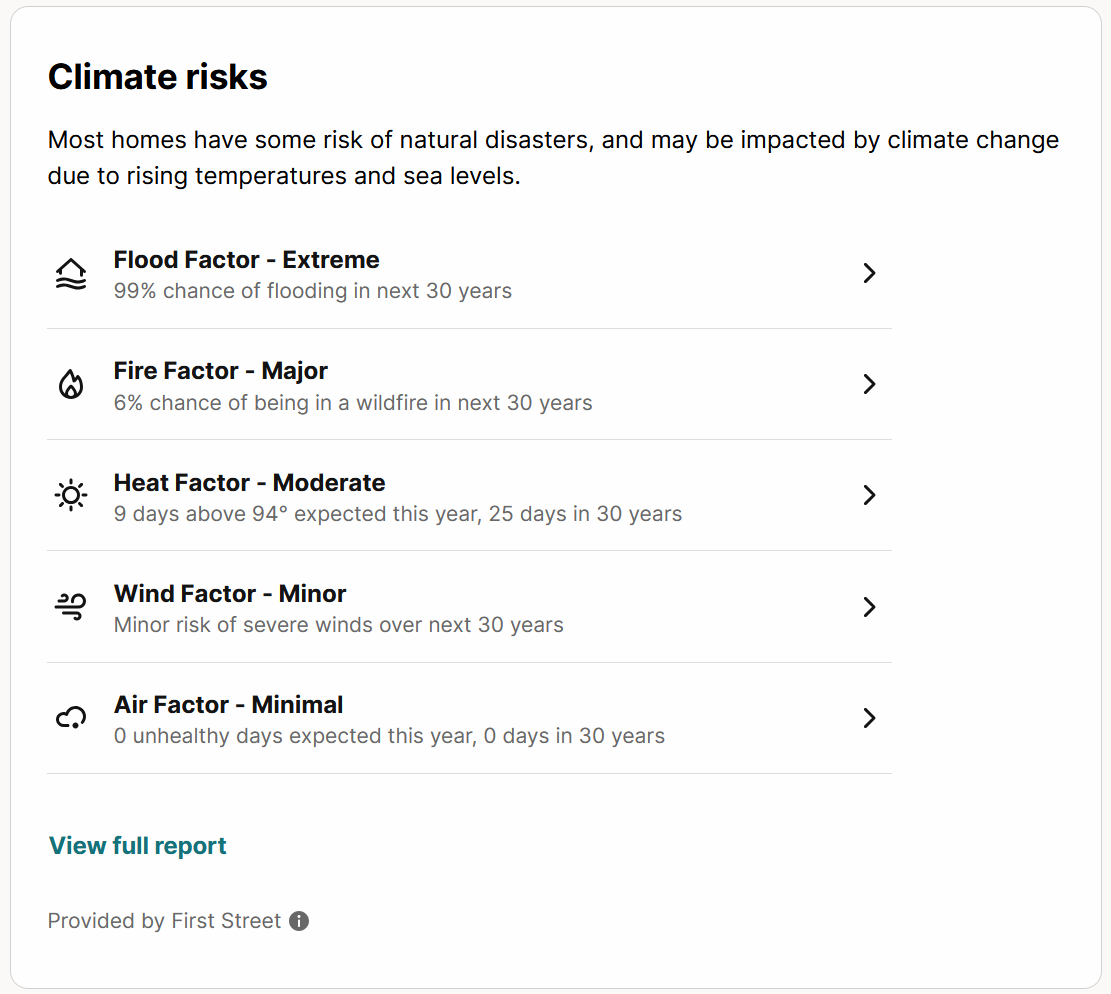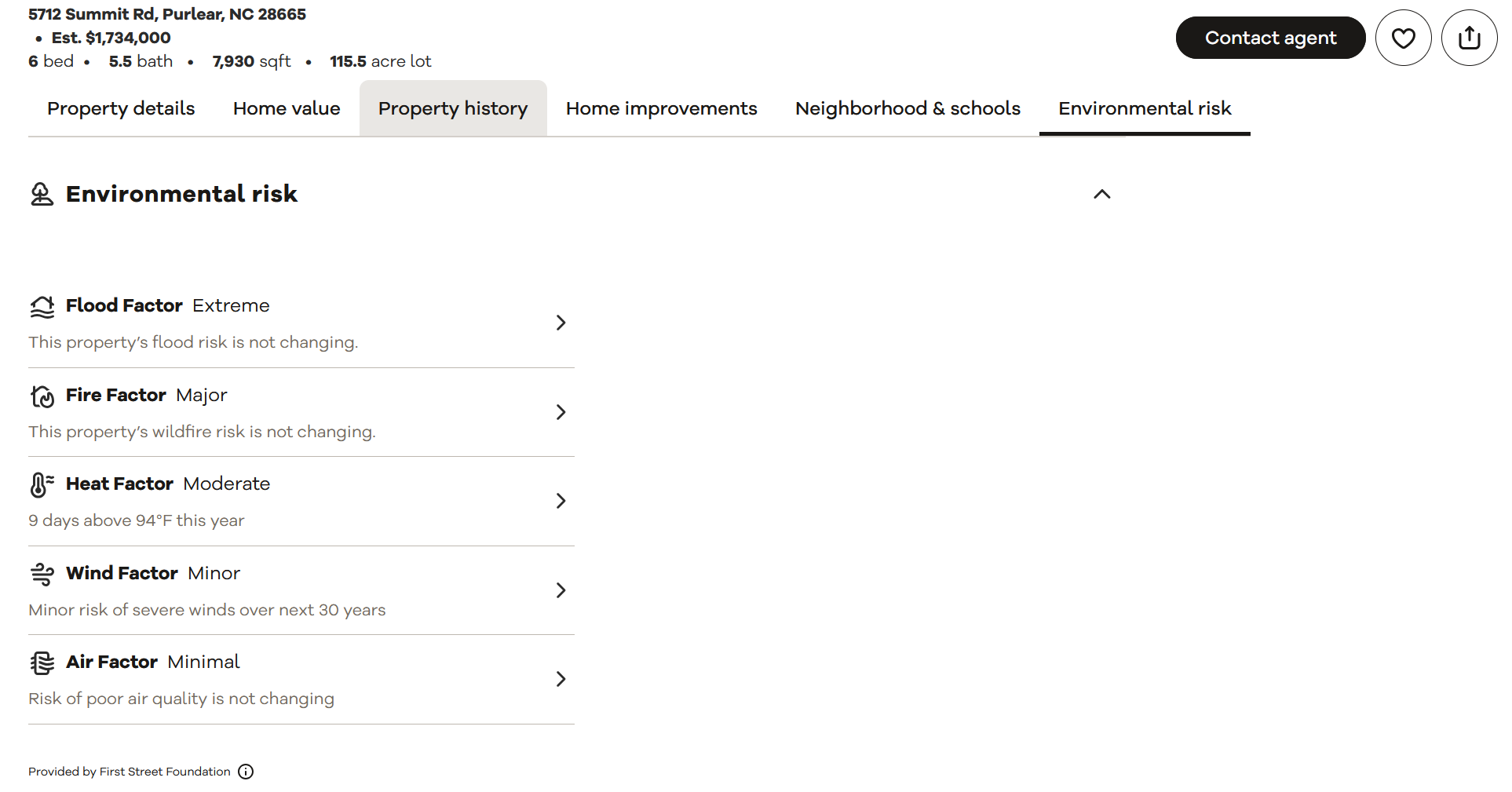Global organizations and corporations are colluding to make home ownership even harder for the average American. That’s what Stephanie Cross, a real estate agent and horse rancher working in Tennessee and North Carolina, told IW Features that she uncovered when she began questioning Zillow’s “climate risks” data on home listings.


Cross first discovered these climate scores at the beginning of this year on the Zillow listing for a $6.2 million North Carolina luxury estate she is representing.
“My North Carolina seller reached out to me,” Cross told IW Features. “He said, ‘Stephanie, Zillow has got something on my property… They’ve got that I’m either a severe risk or a nine out of 10 flood risk, and that flood insurance is recommended.’”
The property, however, is not in the Federal Emergency Management Agency (FEMA) floodplain and therefore does not require flood insurance, according to Cross.
When Cross began looking into why Zillow had placed a flood risk recommendation on the property anyway, she discovered it was part of the real estate website’s climate scoring system. According to Zillow, the climate data indicates a property’s history of “climate-related events,” including flooding, wildfires, poor air quality, extreme heat, and high wind risk. The data itself comes from First Street Technology, which “exist[s] to make the connection between climate and financial risk at scale for financial institutions, companies and governments.”
However, as Cross pointed out and as First Street’s website notes, First Street’s flood data is separate from the FEMA data relied upon by insurance companies. In fact, First Street says they estimate for “future environmental changes due to sea level rise or changes in precipitation.” The true possible impact of a changing climate is uncertain and debated, making First Street and Zillow’s climate predictions conjecture at best.

Cross has nearly eight years of real estate experience and was first introduced to the field when she was traveling to compete as an award-winning barrel racer—a rodeo sport where she raced horses around a barrel configuration. As a result, Cross and her Western spirit weren’t going to back down easily. She began researching Zillow’s possible incentives and said she discovered that BlackRock and the Vanguard Group are two of Zillow’s top shareholders. She noted that both of these organizations have been exposed as promoting ESG (Environment, Social, and Governance) scores that are touted by climate activists.
Another component of ESG that Cross said she believes First Street is engaged in is the 30×30 Agenda, which is “an effort to protect 30 percent of U.S. lands and waters by the year 2030” and “aim[s] to confront the climate and extinction crises,” according to one climate activist group. This agenda mirrors the United Nations’ 17 Sustainable Development Goals for—in part—“tackling climate change.” In turn, these 17 goals have been championed by the World Economic Forum (WEF), known for promoting the idea that “You’ll own nothing. And you’ll be happy,” and its support for ESG through its Great Reset plan.
Cross explained that the Biden-era “Executive Order on Tackling the Climate Crisis at Home and Abroad” was America’s version of the 30×30 agenda with “the goal of conserving at least 30 percent of our lands and waters by 2030.” However, critics have noted that the order’s definition of “conserving” was unclear and that the order did not describe current conservation practices or create clear success metrics. Public land data also demonstrate that over 40 percent of U.S. land—or 252,758,091 acres—is already federally protected.
Though President Donald Trump has reversed this executive order, Cross said she believes that First Street and Zillow are still carrying out the 30×30 Agenda, using real estate climate scores to confuse, mislead, and discourage buyers.
Cross enjoys spending time tending to her ranch, where she breeds American Quarter Horses, so she is a strong proponent of property rights.


“My background has always been farming, horses, cattle,” Cross confirmed. “That’s how I grew up.”
As a result, she opposes the 30×30 agenda and added that each day the score was affixed to her listing damaged her attempts to sell the property.
“Why would you want a property, especially with a state like North Carolina that had such a stigma on it from Hurricane Helene?” Cross asked. “Most are going to just scroll and say, ‘That’s a big, hard, “No, I’m going to pass on that.”’”
As ordinary buyers would naturally avoid the properties labeled high risk, she said that climate activist organizations can then purchase the land, in line with the 30×30 agenda, the WEF’s “you’ll own nothing” mantra, and BlackRock and Vanguard’s ESG goals.
“They then will attempt to swoop in and hopefully be able to buy it for a fraction of the cost because [sellers are], at that point, desperate,” she explained.
“Through doing that, they are controlling food production,” and even the production of critical resources, Cross added. “If they own the majority of the land that has these minerals that you can extract the mining or oil and gas, then, bingo, mission accomplished for them.”
“It’s a land grab,” she explained. “It’s a scarcity thing where you end up having to rent or be in some form of government housing.”
Cross’s suspicions were initially alerted to these connections when she reached out to Zillow to get the alleged inaccurate climate data removed from her listing, she told IW Features.
“They wouldn’t respond by phone,” she said. “If you’re not a Zillow Premier Agent, they won’t communicate with you.”
Then, Cross said she emailed Zillow informing the company that she would take further action if they did not remove the climate score, and she received a generic response message.
“Thirty minutes after that, I received an email inquiry from a gentleman expressing interest in my seller’s property and [asking,] ‘Could you put buildings on it?’” Cross said.

According to Cross, this request didn’t make sense because the property is somewhat remote and not ideal for commercial reasons. As a result, she said she called the individual and asked if he was inquiring about the correct listing.
Then, Cross said that the man changed his story and that he said the property could be a retreat location for his company. At this point, Cross said she asked the name of the man’s company and learned that he represented the Civilization Research Institute.
“I’ve got him on speaker [phone], and I’m Googling, and I see that they’re climate activists,” Cross told IW Features. “It’s a climate activist company… [They] are assessing these properties, potentially.”
“I just found the timing to be not a coincidence that Zillow doesn’t respond to me, but this group—this climate activist group—calls and expresses interest in buying it 30 minutes after I say, ‘Get it off, or there’s going to be further recourse,’” Cross continued.
When Cross first heard from the property owner about the score, she said she discovered that Zillow wasn’t the only listing database with these scores: popular services, including Realtor.com, Homes.com, and Redfin, also list climate data from First Street.

Further adding to the confusion is First Street’s own data on the property, as it labels one listing of the property on its website with a 9/10 flood score and another listing—which is used by Homes.com—with a 1/10 flood score. Additionally, the second building on the property receives its own climate listing with a 1/10 flood score.
“Across the street is a one out of 10, but it has the same elevation,” Cross said. “The properties in our neighborhood who are in the flood zones have low risk ratings as well. That’s the thing—they can’t get their facts straight.”
Cross told IW Features that all she would like is for the information to be correct, but unfortunately, First Street does not let homeowners or realtors dispute climate scores, according to the organization’s website.
As she dug deeper into the matter and got connected with investigative reporters, Cross said that Zillow marked the property as “off-market,” removed the climate data, and listed the value as a comparatively measly $401,010. Yet, according to data also available on Zillow, the property sold for over $1.8 million over five years ago—even before average housing prices in North Carolina spiked more than 70%.
“It’s making it difficult for buyers today, especially first-time home buyers,” said Cross.
She has heard from other realtors across the country, frustrated with similar circumstances. And online, she said she found forum posts from confused and concerned individuals trying to decipher these climate scores and whether they are accurate.


For Cross, it’s another hurdle added to her job as a realtor, especially as she balances a busy life ranching and building her own oil and natural gas startup in Tennessee, Jehovah Jireh Resources. But despite the uphill battle she faces against industry giants like Zillow and First Street, she is still championing conservation and property ownership.
“[Anti–fossil fuel activists] really don’t understand how many uses there are with fossil fuels in their everyday life,” she said. “If we were called to steward creation and we’re called to steward our earth, you can do [natural resource extraction]… They are married together in conservation.”











